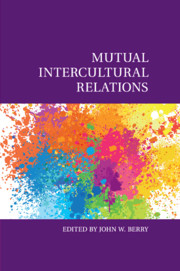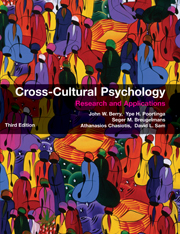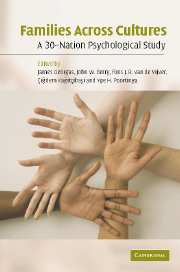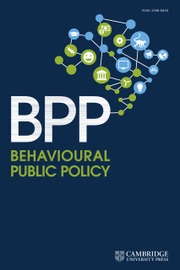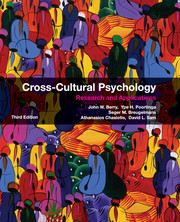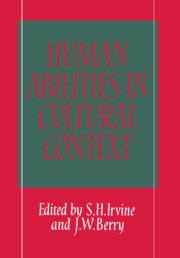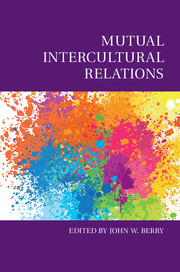The Cambridge Handbook of Acculturation Psychology
Part of Cambridge Handbooks in Psychology
- Editors:
- David L. Sam, Universitetet i Bergen, Norway
- John W. Berry, Queen's University, Canada
- Date Published: August 2006
- availability: Temporarily unavailable - available from TBC
- format: Paperback
- isbn: 9780521614061
Paperback
Other available formats:
eBook
Looking for an inspection copy?
Please email [email protected] to enquire about an inspection copy of this book
-
In recent years the topic of acculturation has evolved from a relatively minor research area to one of the most researched subjects in the field of cross-cultural psychology. This edited handbook compiles and systemizes the current state of the art by exploring the broad international scope of acculturation. A collection of the world's leading experts in the field review the various contexts for acculturation, the central theories, the groups and individuals undergoing acculturation (immigrants, refugees, indigenous people, expatriates, students and tourists) and discuss how current knowledge can be applied to make both the process and its outcome more manageable and profitable. Building on the theoretical and methodological framework of cross-cultural psychology, the authors focus specifically on the issues that arise when people from one culture move to another culture and the reciprocal adjustments, tensions and benefits involved.
Read more- The first handbook for the highly topical research area of acculturation
- Includes contextual features and theoretical, methodological and applied issues central to acculturation
- Features contributions from authors in over ten different countries, many with first hand experiences of acculturation
Reviews & endorsements
'This book is a must for any scholar interested in the topic of acculturation. It provides a comprehensive overview of key theories, concepts and methods, and highlights the unique experience of varied groups coming into cultural contact across a wide range of circumstances. This would be a great textbook for a graduate level cross-cultural psychology course, and a necessary addition to the reference shelf of any cross-cultural scholar.' Dina Birman, University of Illinois, Chicago
See more reviews'A collection of authoritative original research papers which should prove useful to scholars, practitioners and policy makers engaged with minority ethnic groups and immigrants.' Paul Ghuman, University of Wales, Aberystwyth
'This Handbook marks a major landmark in the development of acculturation studies, and provides a comprehensive, authoritative and cutting-edge review of what is now a multifaceted subject. This volume will be an indispensable resource.' Félix Neto, Universidade do Porto, Portugal
Customer reviews
Not yet reviewed
Be the first to review
Review was not posted due to profanity
×Product details
- Date Published: August 2006
- format: Paperback
- isbn: 9780521614061
- length: 576 pages
- dimensions: 246 x 174 x 32 mm
- weight: 1.13kg
- contains: 15 tables
- availability: Temporarily unavailable - available from TBC
Table of Contents
Foreword Jean S. Phinney
1. Introduction David L Sam and John W. Berry
Part I. Theories, Concepts and Methods:
2. Acculturation: conceptual background and core components David L. Sam
3. Contexts of acculturation John W. Berry
4. Stress perspectives on acculturation John W. Berry
5. Culture learning approach to acculturation Anne-Marie Masgoret and Colleen Ward
6. Ethnic identity and acculturation Karmela Liebkind
7. Development and acculturation Brit Oppedal
8. Personality and individual factors in acculturation Ankica Kosic
9. Design of acculturation studies John W. Berry
10. Assessment of psychological acculturation Judit Arends-Tóth and Fons van de Vijver
Part II. Research with Specific Acculturating Groups:
11. Immigrants Jan Pieter van Oudenhoven
12. Sojourners Stephen Bochner
13. Refugees and asylum-seekers in societies James Allen, Aina Basilier Vaage and Edvard Hauff
14. Refugees in camps Giorgia Doná and Lisanne Ackermann
15. Indigenous peoples Siv Kvernmo
Part III. Acculturating Contexts: Societies of Settlement:
16. Acculturation in Australia and New Zealand David L. Sang and Colleen Ward
17. Acculturation in Canada Kimberly A. Noel and John W. Berry
18. Acculturation in Israel Gabriel Horenczyk and Uzi Ben-Shalom
19. Acculturation in the United States Huong H. Nguyen
20. Acculturation in European societies Karen Phalet and Ankica Kosic
21. Acculturation in Francophone European societies Colette Sabatier and Virginie Boutry
22. Acculturation in the Nordic countries Charles Westin
23. Acculturation in the United Kingdom Lena Robinson
Part IV. Applications:
24. Acculturation of immigrant children and women David L. Sam
25. Acculturation and the school Paul H. Vedder and Gabriel Horenczyk
26. Immigrants in the labour market John E. Hayfron
27. Acculturation and health David L. Sam
28. Immigration and resilience Esther Ehrensaft and Michel Tousignant
29. Intercultural relations in plural societies Colleen Ward and Chan-Hoong Leong
30. Intercultural training Dharm Bhawuk, Dan Landis and Kevin Lo
31. Conclusions John W. Berry, David L. Sam and Amanda Rogers.
Sorry, this resource is locked
Please register or sign in to request access. If you are having problems accessing these resources please email [email protected]
Register Sign in» Proceed
You are now leaving the Cambridge University Press website. Your eBook purchase and download will be completed by our partner www.ebooks.com. Please see the permission section of the www.ebooks.com catalogue page for details of the print & copy limits on our eBooks.
Continue ×Are you sure you want to delete your account?
This cannot be undone.
Thank you for your feedback which will help us improve our service.
If you requested a response, we will make sure to get back to you shortly.
×


